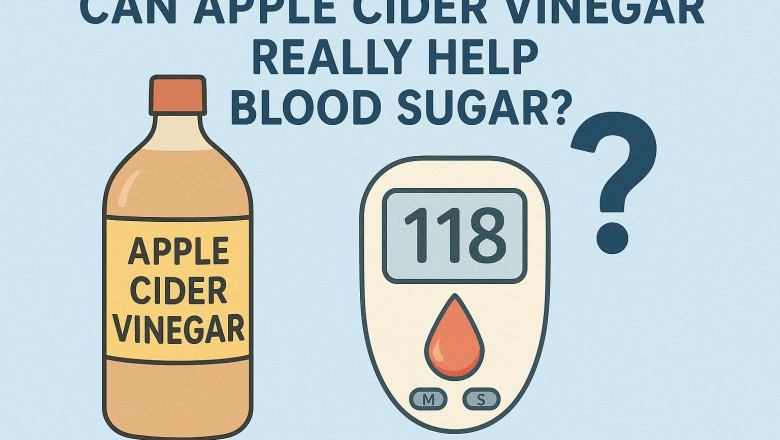views
Apple cider vinegar (ACV) has become a popular natural remedy for managing blood sugar, with many health professionals and fitness enthusiasts praising its potential benefits. But is there any science behind the claims, or is it just a trend? In this article, we'll explore the research on apple cider vinegar's effects on blood sugar, how it works in the body, and how to use it safely to improve blood sugar control.
What Is Apple Cider Vinegar?
Apple cider vinegar is produced by fermenting apple juice into alcohol and then converting it into acetic acid, the compound responsible for most of its health benefits. Raw, unfiltered ACV, which contains the "mother," also offers beneficial bacteria, enzymes, and small amounts of potassium, magnesium, and antioxidants.
How Apple Cider Vinegar Affects Blood Sugar
Research suggests that ACV can help regulate blood sugar levels, particularly after meals. Here's how it works:
-
Improves Insulin Sensitivity
Insulin is essential for transporting glucose from the bloodstream into cells. ACV has been shown to enhance insulin sensitivity, especially after meals rich in carbohydrates. A 2004 study published in Diabetes Care found that people who consumed vinegar before a high-carb meal had 34% lower post-meal blood sugar levels compared to those who didn't consume it. -
Slows Carbohydrate Digestion
The acetic acid in apple cider vinegar slows the breakdown of starches in the digestive system. This slower digestion means glucose is released into the bloodstream more gradually, helping prevent sharp spikes in blood sugar. -
Reduces Fasting Blood Sugar
Some smaller studies have found that consuming ACV before bed can reduce fasting blood sugar levels the following morning, especially in individuals with insulin resistance or type 2 diabetes.
Who Can Benefit from ACV?
Apple cider vinegar may help individuals who:
-
Have type 2 diabetes or prediabetes
-
Struggle with insulin resistance
-
Experience frequent blood sugar spikes after meals
-
Are looking for natural ways to support glucose control
However, it's important to note that ACV should not replace medical treatment or prescribed medications. It can serve as a supportive tool alongside other management strategies.
Also Read: Glucotrust Review 2025
How to Use ACV Safely
While ACV is beneficial, it's important to use it properly to avoid potential side effects. Due to its high acidity, improper use can damage your teeth, throat, or stomach.
Recommended Dosage:
-
1–2 teaspoons (up to 1 tablespoon) diluted in a large glass of water
-
Drink before meals or before bedtime
-
Start slowly and monitor how your body responds
Things to Avoid:
-
Drinking ACV undiluted
-
Overconsuming (more is not better)
-
Mixing with sugary juices or sodas
Optional Additions:
-
Add a little lemon juice or stevia to enhance the taste
-
Mix with warm (not hot) water and drink slowly
Potential Side Effects
Although ACV is generally safe in moderation, it can cause some side effects, such as:
-
Tooth enamel erosion (use a straw and rinse your mouth afterward)
-
Acid reflux for some individuals
-
Low potassium levels if overused
-
Interaction with diabetes or blood pressure medications
It's important to consult with a healthcare professional before adding ACV to your daily routine, especially if you are on medication or have digestive issues.
Final Verdict: Is It Worth Trying?
Apple cider vinegar can be a useful and natural option for managing blood sugar levels, particularly for those with insulin resistance or type 2 diabetes. It is affordable, easy to use, and accessible, but should be part of a broader approach that includes a balanced diet, regular exercise, and proper sleep hygiene. When used correctly, ACV can offer additional support for blood sugar control, but it's essential to do so safely and in moderation. You must try Glucoberry.






















Comments
0 comment